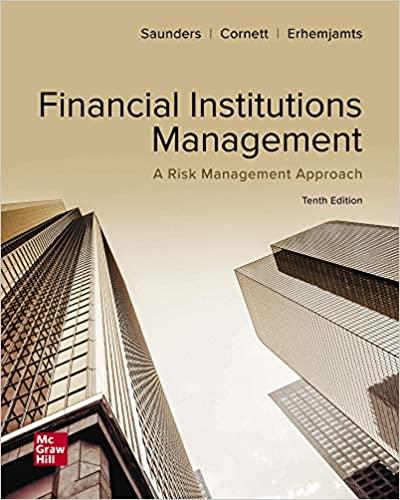Question
Choose the best answer (True or False) for each of the following questions. 1. Homeowners often repay all or part of their mortgage balance prior
Choose the best answer (True or False) for each of the following questions.
1. Homeowners often repay all or part of their mortgage balance prior to the scheduled maturity date. The amount of the payment made in excess of the monthly mortgage payment is called a prepayment.
2. The conventional loans that qualify are referred to as conforming loans. A conforming loan is simply a conventional loan that meets the underwriting standard of Fannie Mae and Freddie Mac. Thus, conventional loans in the market are referred to as conforming conventional loans and nonconforming conventional loans.
3. Investors face four main risks by investing in residential mortgage loans: (1) credit risk, (2) liquidity risk, (3) price risk, and (4) prepayment risk.
4. The price of a fixed-income instrument will move in an opposite direction from market interest rates. Thus, a rise in interest rates will decrease the price of a mortgage loan.
5. Prepayment risk is the risk associated with a mortgage's cash flow due to prepayments. More specifically, investors are concerned that borrowers will pay off a mortgage when prevailing mortgage rates fall below the loan's note rate
6. The two GSEs, Fannie Mae and Freddie Mac, can purchase any type of loan; however, the only conventional loans that they can securitize to create a mortgage-backed security are conforming loans, that is, conventional loans that satisfy their underwriting standards.
7. The subprime mortgage sector is the market for loans provided to borrowers with an impaired credit rating or where the loan is a second lien; these loans are nonconforming loans
8. A mortgage pass-through security, or simply pass-through security, is a type of MBS created by pooling mortgage loans and issuing certificates entitling the investor to receive a pro rata share in the cash flows of the specific pool of mortgage loans that serves as the collateral for the security. Because there is only one class of bondholders, these securities are sometimes referred to as single-class MBS.
9. A weighted-average coupon rate (WAC) is found by weighting the note rate of each mortgage loan in the pool by the amount of the mortgage outstanding. A weighted-average maturity (WAM) is found by weighting the remaining number of months to maturity for each mortgage loan in the pool by the amount of the mortgage outstanding.
10. The prepayment rate assumed for a pool, called the conditional prepayment rate (CPR), is based on the characteristics of the pool and the current and expected future economic environment.
Step by Step Solution
There are 3 Steps involved in it
Step: 1

Get Instant Access to Expert-Tailored Solutions
See step-by-step solutions with expert insights and AI powered tools for academic success
Step: 2

Step: 3

Ace Your Homework with AI
Get the answers you need in no time with our AI-driven, step-by-step assistance
Get Started


